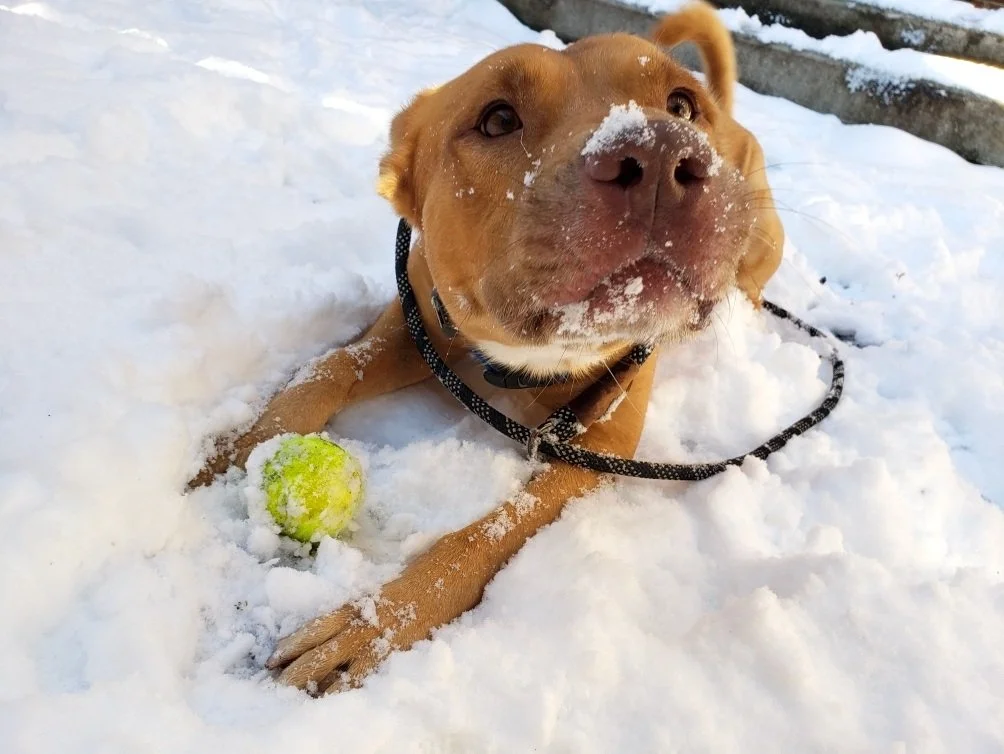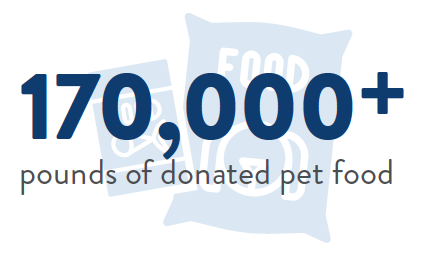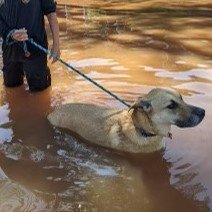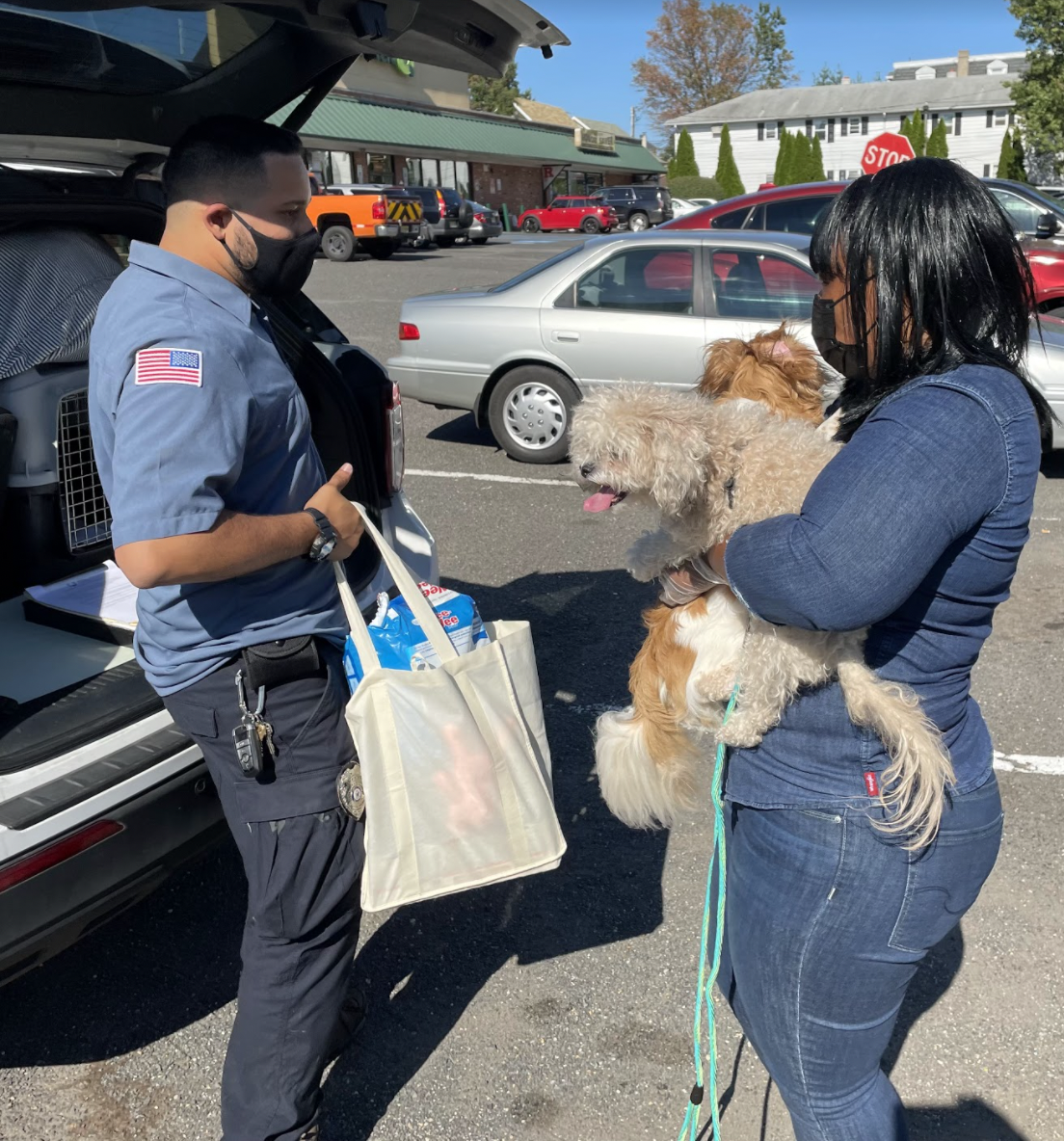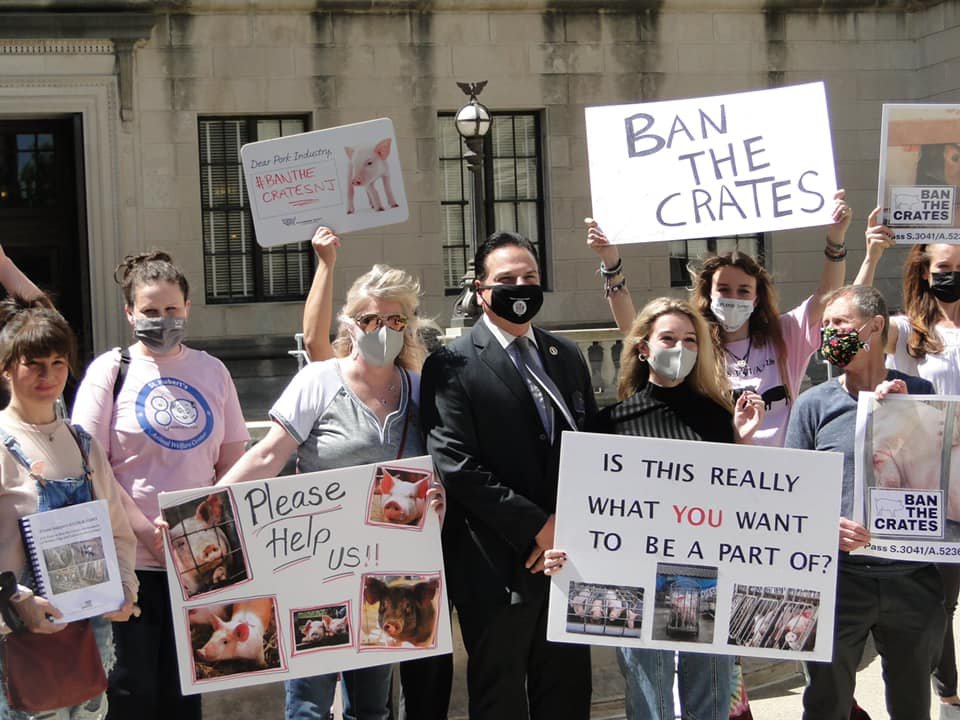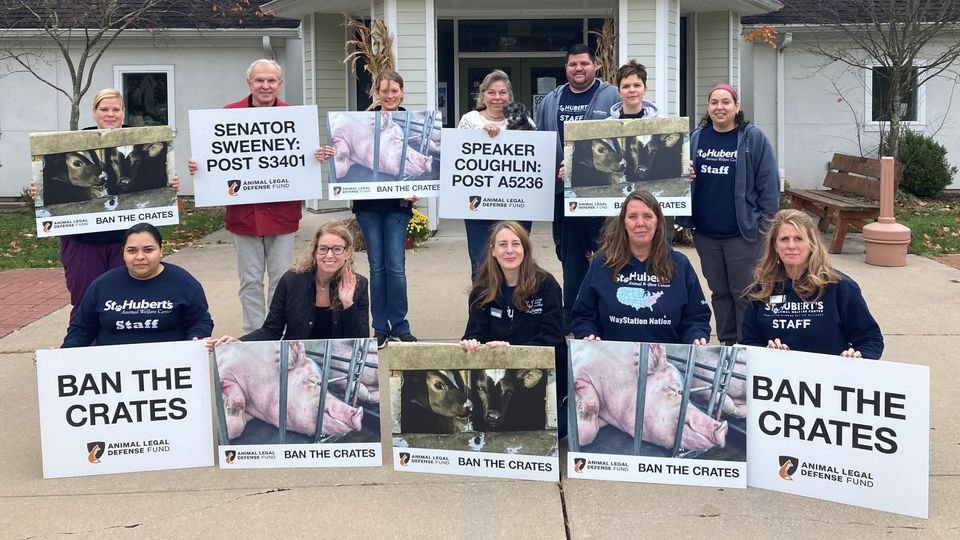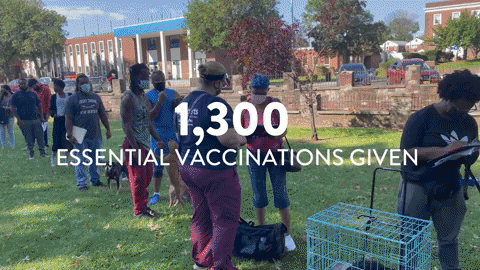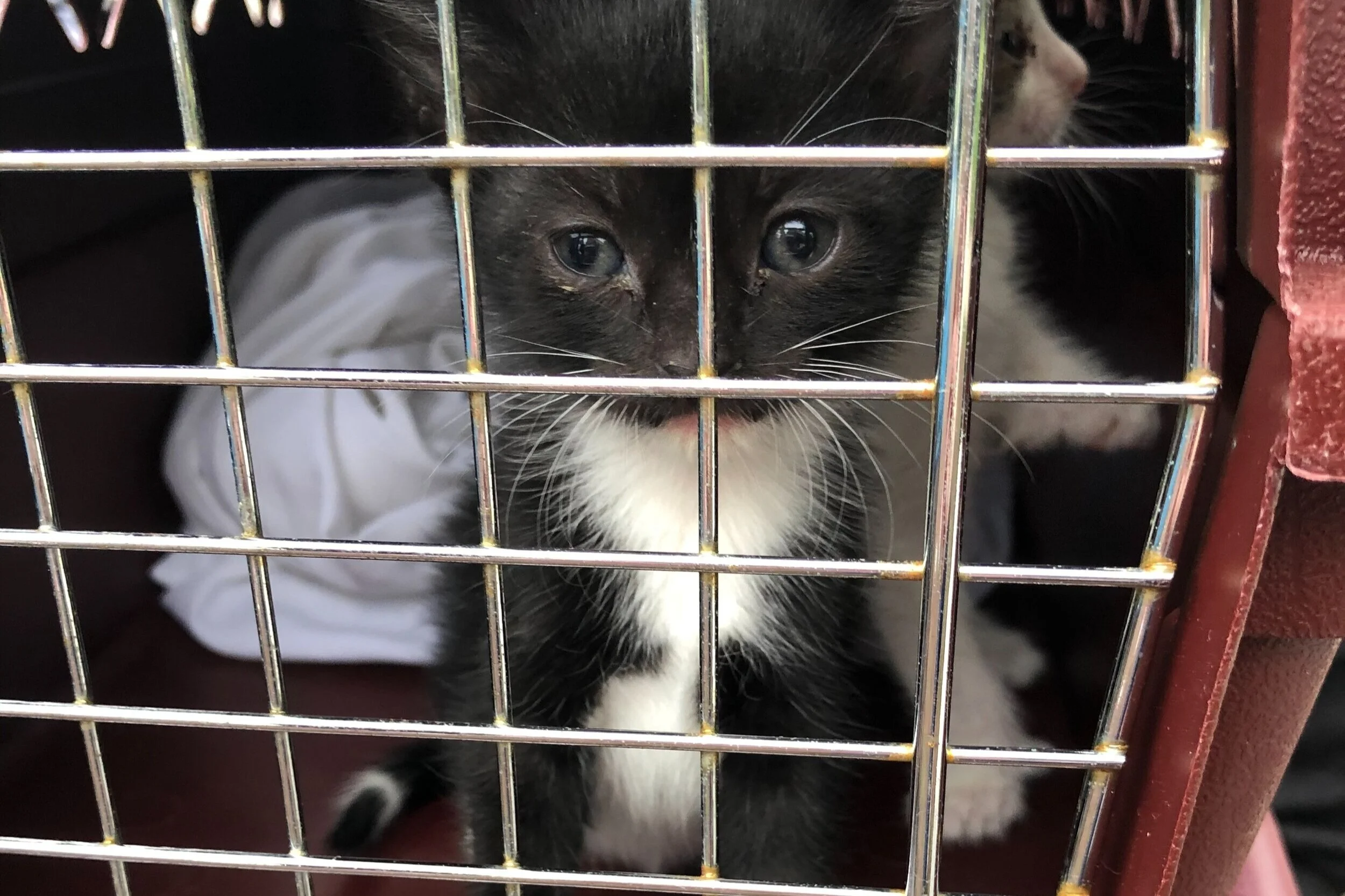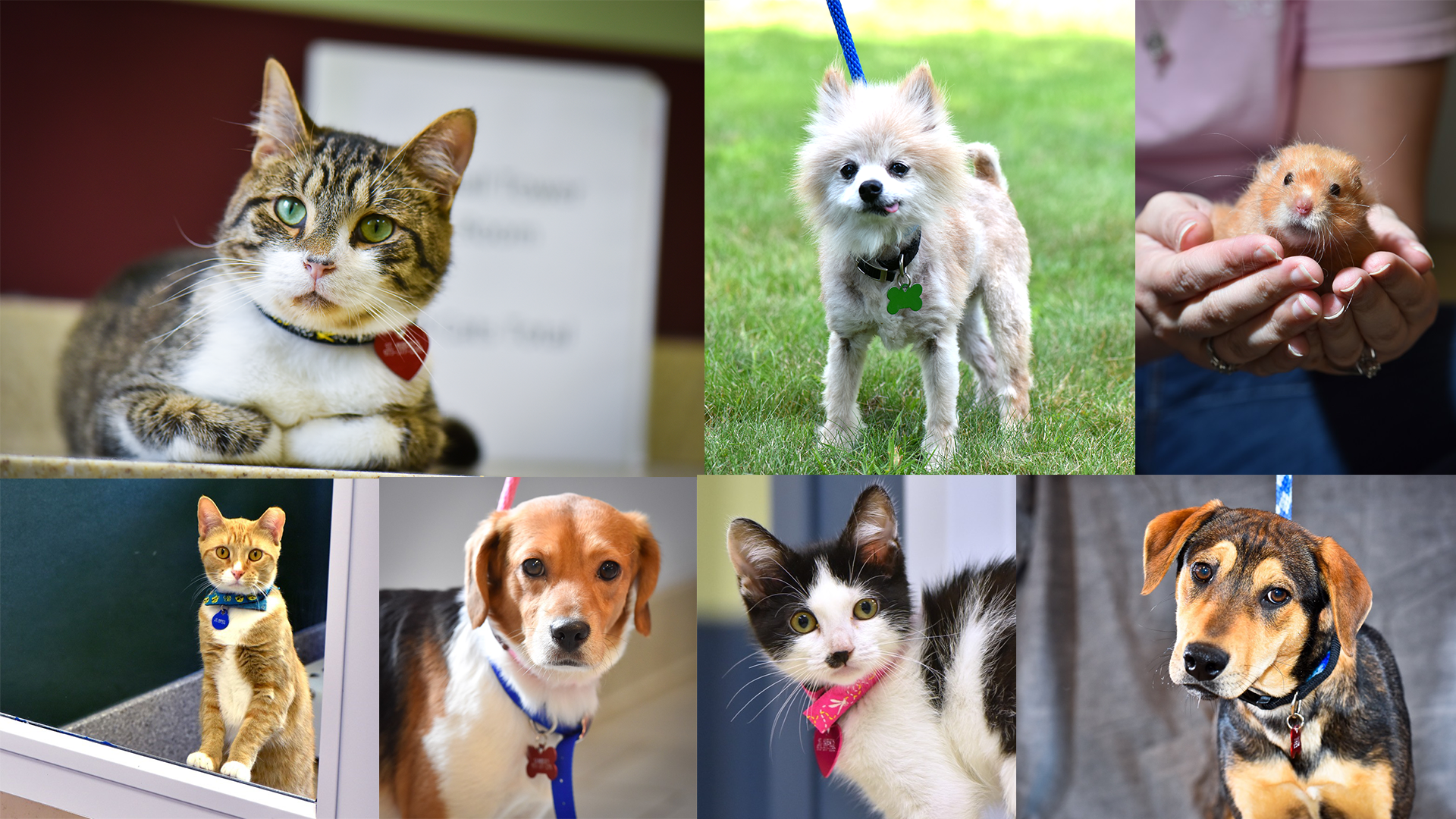
LATEST NEWS
How to keep pets safe in cold weather
As the temperature drops into the 30s, it’s time for some helpful reminders for pet parents about how to protect your pets during cold weather. Taking a few extra precautions can help keep your beloved companion safe and warm during the winter months.
Limit your pet’s time outside during extreme temperatures. If it’s too cold for you, it’s likely too cold for your pet. Similar to humans, pets are also susceptible to frostbite and hypothermia.
Protect your pet’s paws from irritation caused by salt and other chemicals by applying products such as petroleum jelly or Musher’s Secret before heading outside. These products create a wax-like barrier that hydrates and safeguards your pet’s paws from the elements. If your pet will allow them, boots provide even more coverage and can also prevent sand and salt from getting lodged between bare toes.
After each walk, wash your pet’s feet and abdomen with warm water and towel dry to prevent further irritation from salt, ice, and other harmful chemicals. Check for any redness and cracks on the paw pad and in between the toes.
Never let your dog off the leash on snow or ice, especially during a snowstorm. Dogs frequently lose their scent in snow and ice and easily become lost. More dogs are lost during the winter than during any other season.
Antifreeze, used to protect your car during the winter months, is poisonous and often deadly when ingested by pets. Recognize the signs of antifreeze poisoning and prevent accidental ingestion by thoroughly mopping up any spills.
Use pet-friendly ice melts to help protect your pet’s paws.
Avoid cutting your dog’s hair during the winter. Longer coats provide more warmth. Trim long-haired companions to minimize the clinging of snow and ice.
If your dog is short-haired, consider getting him a coat or sweater with coverage from the base of the tail to the belly.
Provide your pet with a warm place to sleep that is off of the floor and away from all drafts.
New Jersey requires proper shelter if animals will be outside for longer than 30 minutes in freezing conditions.
Disaster Relief Efforts
In the aftermath of Hurricane Ian, nearly 90 shelter pets from Florida were airlifted to New Jersey on October 2.
This life-saving airlift transported dogs and cats who were in shelters prior to the storm. It will help make room for an expected influx of homeless or surrendered pets at Florida shelters.
36 dogs and 54 cats were flown to Morristown, New Jersey and received by over a dozen rescue organizations up north, including St. Hubert’s Animal Welfare Center.
As part of its disaster relief efforts, St. Hubert’s also received a transport of dogs on September 29 from Puerto Rico, which had been battered by Hurricane Fiona.
20,000 Dogs Saved
The St. Hubert’s WayStation transport program celebrated a huge milestone. In August 2022, our team welcomed our 20,000th dog! That means 20,000 animals have been relocated for adoption since the start of the program in August 2016.
The 20,000th dog, named Sweetie Johnson, is an adorable five-year-old terrier mix from Iberville Parish Animal Shelter in Louisiana. Everyone cheered as she made her appearance at the Morristown Airport in a crate decorated with pinwheels and streamers. Our staff and volunteers then celebrated back at the shelter with some sweet treats for both people and our adoptable pups.
A big thank you to our partners Greater Good Charities and to PetSmart Charities for their support of the WayStation program. We couldn’t do this lifesaving work without you!
Submit your Love Story to help St. Hubert’s earn $100K
Has your St. Hubert’s adopted pet changed your life? Share how your pet has made a difference in your life to help St. Hubert’s earn up to $100,000 in lifesaving funds! Petco Love wants to know all the ways, big and small, that your adopted pet has changed your life for the better. Winning stories will receive up to a $100,000 grant award for their adoption organization.
Submit your love story by Tuesday, October 31
If you’ve adopted a pet from St. Hubert’s, and they are still living, share how your pet impacts your life for the better, every day.
Click here to submit your story and photos. You’ll be asked to:
Write your story in 500 words or less.
Visit petcolove.org/lovestories to read prior year’s winning entries and get some inspiration. Remember, good stories will show how your pet changed your life.
Upload three to four photos to support your story:
One photo of just your pet
One photo of you or your family with your pet
One or two additional photos of your choice.
VIEW ANSWERS TO FREQUENTLY ASKED QUESTIONS AT THE END OF THIS PAGE. ADDITIONAL QUESTIONS? EMAIL KROTRAMEL@STHUBERTS.ORG.
5 Myths About Big Dogs Debunked
We really like big dogs here at St. Hubert’s Animal Welfare Center…so we’re debunking five myths about dogs over 40 pounds to give our big four-legged friends the credit they deserve.
Myth #1 “Big dogs can’t live in small spaces, like apartments.”
False! Dogs of all sizes can live in apartments under the right circumstances. It’s not the size of the dog that determines how suitable they are to live in small spaces, rather it’s their energy levels and the amount of exercise and enrichment they require.
Myth #2 “It’s harder to travel when you have big dogs.”
No way! With pet sitting and boarding options readily available, traveling has never been easier for pet parents. Traveling with your large dog is an option, too, and they are more likely to keep up and keep you company on any adventure!
Myth #3 “Big dogs should NOT live with small children.”
Untrue. It’s not the weight of an animal that determines if they’re best suited to be around children but instead their temperament and energy level. Adoption counselors at St. Hubert’s will work with you to find a dog who is the right match for your family.
Myth #4 “Only small dogs can be lap dogs.”
If they think they’re a lap dog, then we couldn’t agree more. It’s just one way dogs show how much they love you.
Myth #5 “Since I can't adopt, there's not much else I can do to help.”
Totally untrue. There are so many other ways to help big dogs. Not only does St. Hubert’s provide adoption services, but we also have a robust foster program that allows people to temporarily house big dogs while they wait to get matched with a loving family of their own. Fosters get to experience the joy and companionship that comes from caring for a big dog without having to make a permanent commitment.
2021: A Year in Review
Our tagline is “Animals. People. Community.” and we use these words to express our belief that the well-being of animals, people, and communities are intertwined, and that by investing in one part of this ecosystem we uplift everyone – humans and animals.
Our team is focused on creating a more humane community where animals and the people who love them can thrive. This year, we found homes for more than 2,600 animals and moved over 3,200 animals from crisis to care through the WayStation. Through our WayStation Give Back program, we gave our transport partners $119,000 in funds to invest in their own communities, helping them to go after the root causes of pet homelessness and suffering. Together with churches, food banks, mutual aid networks, and human services organizations, we gave out 170,000 pounds of free pet food, filling 260,000 empty pet food bowls with meals.
This year we made great progress in addressing the systemic issues and barriers that cause animals to become homeless. We worked with organizations who serve the most vulnerable, building wrap-around programs and services that allowed us to help people and pets as a family unit.
Every animal we care for is part of a community that involves people, too – families, neighbors, and friends. Through your generous support, we grew our capacity to care for homeless animals, support sister shelters, and serve communities near and far. Here are just a few of the amazing animals and people who are central to our work and our mission. Read the full 2021 Year-End Review.
Investing in ANIMALS
Emergency Cat Rescue
In June, St. Hubert’s received a call about a foul odor emanating from a home in South Bound Brook. Animal control officers discovered an extraordinary number of cats living in deplorable conditions. Mounds of household items and trash were piled up throughout the house. Feces littered the floor, and the smell of ammonia from feline urine, which is hazardous to animals and humans, filled the home.
After the homeowner agreed to surrender the cats, our officers began rescuing the felines as quickly and as gently as possible. Staff worked around the clock to evaluate and treat all the cats. Most were malnourished. Many had upper respiratory infections, chronic eye issues, tapeworms, and gastrointestinal parasites. All were severely infested with fleas. In total, after weeks of humanely trapping, they rescued more than 130 cats and kittens.
Most of the cats were extremely fearful. Our behavior team worked with them patiently in the weeks and months ahead to socialize them and help them learn how to trust people.
Caring for so many cats is a huge undertaking, and St. Hubert’s supporters were eager to help, with many donating to the emergency fund to provide medical care for the sick cats. Other animal welfare organizations helped, including the ASCPA. Foster families signed up to care for the felines until they were ready for adoption.
“The support we got from our community was incredible.” said Tiffany Barrow, vice president of operations.
Investing in PEOPLE
Helping people and animals in the wake of Hurricane Ida
In September, as Hurricane Ida slammed into Louisiana wreaking havoc in its path, we deployed a team of responders to assist in disaster relief efforts. Our WayStation team also leapt into action, working with our partner, Greater Good Charities, to airlift adoptable animals from shelters in Louisiana to free up valuable space for pets who were injured and displaced by the storm until they could be reunited with their families.
Then, only days later, remnants of Hurricane Ida hit New Jersey with tornadoes, record rain, and flooding that left the area in a state of emergency. Our Disaster Response Team deployed to help our own communities, the communities where we live and work, to help animals in distress, like Winnie, a beloved family dog, and distributed resources such as food, cat litter, and other pet supplies to residents and community partners in critical need. Winnie’s family wasn’t home when the flooding began, and the water quickly became too high to reach the house where Winnie was trapped. Our team jumped into action to save Winnie and reunite her with her family.
Investing in our COMMUNITY
ADVOCATING FOR ANIMALS IN NEW JERSEY
St. Hubert’s legacy of animal welfare advocacy in New Jersey has expanded through coalition building, which helped to unite the voice of animal care agencies to influence policymaking that impacts our communities. The Compassion for Community Cats Act, which we strongly support, addresses the sad reality that current New Jersey laws don’t address the humane management of outdoor cats and as a result, community cats are euthanized unnecessarily. This legislation endorses and incentivizes trap-neuter-return to do targeted sterilization and provide ongoing care for cats in their outdoor homes; to decrease shelter euthanasia; and to provide resources to those caring for outdoor cats.
We also joined animal welfare organizations across the state to oppose legislation that would have created new financial barriers for owners of pit bull type dogs and several other breeds, making it harder for families to keep their beloved pets and disincentivizing dog adoption and rescue.
Also, we continued what has been an eight-year effort to prohibit the use of gestation and veal crates that confine mother pigs and baby calves in spaces so small that they are immobilized, unable to even turn around. Due to the duration and severity of their confinement, the use of gestation and veal crates are inherently cruel. We have been proud to join in this historic advocacy effort, reflecting our organization’s commitment to ensure that all animals should be treated humanely and with compassion throughout their lives.
Supporting animals and THE people who love them
Our community programs teams are busier than ever as we have stepped up to meet the needs of people and animals in our communities. We resumed our animal health clinics, focusing on neighborhoods with the greatest need. In 2021 we administered 1,300 essential vaccinations and provided thousands of community members with pet food and critically needed supplies. Our pet food bank, which continued during the pandemic without pause, has seen a record number of new clients receiving food and supplies to help them bridge these hard times; we have given out over 170,000 pounds of food to people experiencing economic stress and increased job and housing insecurity.
We also transported 3,200 animals through the WayStation and were able to support source shelters with almost $119,000 in funds returned through our Give Back program. These funds are used for programs and services, like spay and neuter clinics, to help address the root cause of pet overpopulation.
Despite the challenges we have faced, we are prepared to expand our mission work in the months ahead. In many ways, the pandemic reinforced what we already know: the work of an animal welfare agency is more effective when it is centered around expanding access to care and giving pet owners the resources and support they need to care for and keep their pets.
Looking Ahead
Through your support and generosity, we are positioned to help even more animals, support more families, and advocate for greater protections and networks for animals and the people who love them. We are very hopeful about the future of animal welfare and are using the lessons of this extraordinary and difficult time to re-imagine our work. We are questioning old assumptions, trying new approaches, and tackling head on some of the most challenging issues facing animals and their caregivers. As we look ahead, we see a future that is brighter than ever for our animals and the people who cherish them.
St. Hubert's deploys team to assist in Hurricane Ida relief efforts
Read our most recent rescue updates below and if you can, please help and donate today. Donors like you make our lifesaving work possible.
St. Hubert's Receives Emergency Flight of Animals from Louisiana
St. Hubert’s Animal Welfare Center has received an emergency transport of adoptable animals evacuated from Louisiana shelters following Hurricane Ida. The rescue mission arrived at Morristown Airport today (9/1), as the remnants of Ida swept through New Jersey.
Over 70 animals were on the Greater Good Charities flight from Lafayette, LA to Morristown, New Jersey. The transport will help free up space in Louisiana shelters for animals who were injured or displaced after Sunday’s storm.
Soon the dogs and cats will be available for adoption and find new loving homes on the east coast. Organizations taking on the evacuated animals include St. Hubert’s Animal Welfare Center, Humane PA, Pennsylvania SPCA, Liberty Humane Society, Monmouth County SPCA and Delaware Humane Association.
The animals came from Acadiana Animal Aid, St. Charles Parish, St. Martin Parish Animal Services, Lafayette Animal Shelter and Care Center, Terrebonne Parish Animal Shelter, St. John Parish Animal Shelter and Iberville Parish Animal Shelter and Control in Louisiana.
As families lost their homes or were evacuated, Louisiana shelter partners have reported an influx of pets entering their doors. Not only does transporting out animals who were in shelters prior to the storm give those animals new adoption opportunities in the Northeast, but it also helps ensure operating shelters have the capacity to care for animals who were displaced by the storm until they can be reunited with their families.
“In the animal welfare community, when disaster strikes, we’re all in it together,” said Colleen Harrington, Director of St. Hubert’s WayStation Program. “Today’s transport of animals who were already in shelters prior to the storm will allow our Louisiana partners to free up resources and space so they can help displaced pets in their communities.”
In addition, St. Hubert’s and its parent organization, the Humane Rescue Alliance, sent a disaster response team to New Orleans, after receiving a call for help from the Louisiana SPCA.
The emergency response in Louisiana comes shortly after a flash flood took the lives of at least 20 people and destroyed over 270 homes in Waverly, Tennessee. The shelter in Waverly, Humphreys County Humane Society, was overwhelmed with pets in need of emergency sheltering. St. Hubert’s stepped up to assist its partner in Waverly, arranging the transport of 37 already adoptable dogs to New Jersey on Monday (8/30).
We are so grateful to be able to help, but responding to multiple disasters in one month puts a serious drain on our resources and we need your support. You make our lifesaving work possible, and give hope to families faced with disaster. If you can, please donate today.
UPDATE: September 2, 2021
On Wednesday, our Disaster Response Team was responding to animal control calls in Orleans Parish when a concerned resident flagged them down, alerting them to a dog who was trapped underneath a collapsed shed. Our team and officers with the Louisiana SPCA rushed to the scene, where they found a scared dog chained inside of the shed and tangled under the debris. We suspect the dog had been stuck there – terrified in the sweltering heat with no food or water -- since the storm hit on Sunday. Our team carefully lifted the shed enough so we could guide the dog out from underneath and free him from the chain. Thankfully, and perhaps miraculously, the dog – who a young neighbor watching the rescue named Bubbles – was not injured. Once freed from the shed, Bubbles was super friendly and sweet and became almost immediately affectionate toward his rescuers. We transported him to safety at the Louisiana SPCA.
UPDATE: September 3, 2021
Today our Disaster Response Team is shifting focus to help our communities right here in New Jersey, after remnants of the hurricane caused tornadoes, record rain and flooding. Our Disaster Response Team is deploying to communities throughout Northern New Jersey this morning to help animals in distress and distribute resources such as food, litter, and other pet supplies to residents in need. We have also received calls from animal shelters throughout the region who have experienced flooding and power outages. We have team members in route to those shelter to evaluate their needs and provide support.
Emergency Cat Rescue
St. Hubert’s Animal Welfare Center rescued over 100 cats in an alleged neglect situation at a home in South Bound Brook, New Jersey. Animal control officers from St. Hubert’s were called to assist the South Bound Brook Police Department after a neighbor complained about a foul odor coming from the home.
When our officers arrived at the home they discovered an extraordinary number of neglected cats and kittens living in poor conditions. The odor was ammonia from an extreme buildup of feline urine, which is hazardous to animals and humans.
Our team immediately got to work – despite the waste and clutter, they rescued 113 cats, including 46 neonatal kittens, as quickly and as gently as possible. Most of the cats have upper respiratory issues and some have severe eye infections. All of them need to be spayed or neutered. And many are scared, sickly, and underweight.
“It is gut-wrenching to see so many cats and kittens living in filthy, poor conditions,” said Chris Schindler, Vice President of Field Services for St. Hubert’s Animal Welfare Center. “We are grateful to the South Bound Brook Police Department for answering the call to help these animals.”
Our teams in Madison and at the Kitten NICU are working around the clock to care for these cats. But we still need your help. Please consider making a donation today to help us continue to provide the best possible care to every cat and kitten.
Related Media Coverage
NY Daily News, nj.com, News 12 NJ, WCBS-TV, NJ 101.5,WCBS-AM, WPIX-TV
Here's why pandemic pets are not being returned
In March 2020, when the world shut down, our community members opened their hearts and homes to homeless animals. This included a surge both in foster and adoptive homes. During the pandemic, as people struggled with social isolation and being separated from friends and family, we saw so many people find joy, companionship, and even entertainment from sharing their homes with animals.
Despite false news headlines suggesting pets adopted during the pandemic are being returned to shelters across the country in droves now that schools and offices are opening back up, we haven’t experienced an increase in returns, and data from shelters around the country indicate they haven’t either.
Keeping pets and people together begins the moment someone comes to us looking to expand their family through adoption. We start the process by having an open conversation with potential adopters that allows us to pair them with an animal who fits with their lifestyle and situation. This also helps us understand if there are additional resources or support needed for the match to be successful.
This dialogue doesn’t end when the animal goes to his or her new home. At St. Hubert’s we provide individualized services for both people and their pets with the understanding that life is unpredictable and can include changes in finances and housing or behavioral or medical needs for the pet. Through direct follow up conversations, we support families in addressing their unique post-adoption needs.
Our programs and services are anchored in the belief that everyone deserves the love and companionship of sharing their life with a pet. So, we are here for our community to help with all their pet-related needs, whether it is low cost-veterinary care, free pet food, emergency boarding, resources on accessing pet friendly housing, behavior support, or end of life care.
As we begin to prepare to return to work and school, St. Hubert’s can provide support in preparing pets for that transition as well. We prepared a webinar with guidance on how to prevent and treat separation distress. We also offer a host of behavior and training class options to fit your needs, whether it is a private session, group class, or virtual.
In the beginning of the pandemic, our first belief was that dozens of animals would be surrendered to shelters because families couldn’t care for them. But those animals never came. COVID reinforced our belief that animals are family, and our community members did everything they could to keep their family members with them, even in the face of illness and economic uncertainty.
Likewise, as offices reopen and social life begins to return to normal, it’s not surprising that the vast majority of animals who were adopted during the pandemic remain in their homes. It speaks to the shifting role of pets in our society as beloved family members. COVID has been an inflection emphasizing that evolution.
$5,000 reward for info in animal cruelty case
St. Hubert's Animal Welfare Center is offering a $5,000 reward for information leading to the identification, arrest and conviction of the person or persons involved in a case of alleged animal cruelty.
On the evening of Jan. 23, a St. Hubert's Animal Control Officer responded to a call about a small dog who was abandoned in the freezing cold outside an apartment complex in Irvington, New Jersey. The dog, who rescuers named Lux, had been tied with a rope to a pole on the corner of North Maple Avenue and Eastern Parkway. Lux was extremely matted and in intense pain. The matting not only blocked circulation to one of his paws, it pinched and pulled at his skin with every little movement.
Our officer rushed Lux to an emergency veterinary hospital, where the medical team gently cut away the mats and treated him for his wounds. Unfortunately, Lux's paw was so severely damaged, his entire leg had to be amputated.
St. Hubert's is looking for anyone who may have noticed anything unusual near the area of North Maple Avenue and Eastern Parkway in Irvington on Jan. 23, as well as anyone who recognizes the dog or has information about those responsible for his condition. If you have information, please call 973-377-2295.
"We need help from our community to help find those responsible for this act of animal cruelty," said Chris Schindler, Vice President of Field Services. "We're hopeful this reward will encourage anyone with information to come forward as soon as possible."
St. Hubert's is using its emergency fund designated to cover the expense of medical care and rehabilitation of animals like Lux. We are asking for donations (www.sthuberts.org/lux-dog-5) to pay for Lux's medical care and to help other animals with critical medical needs.

